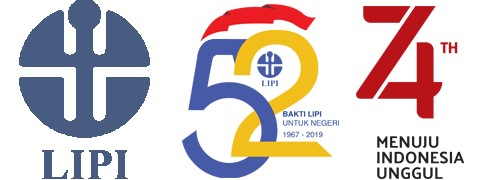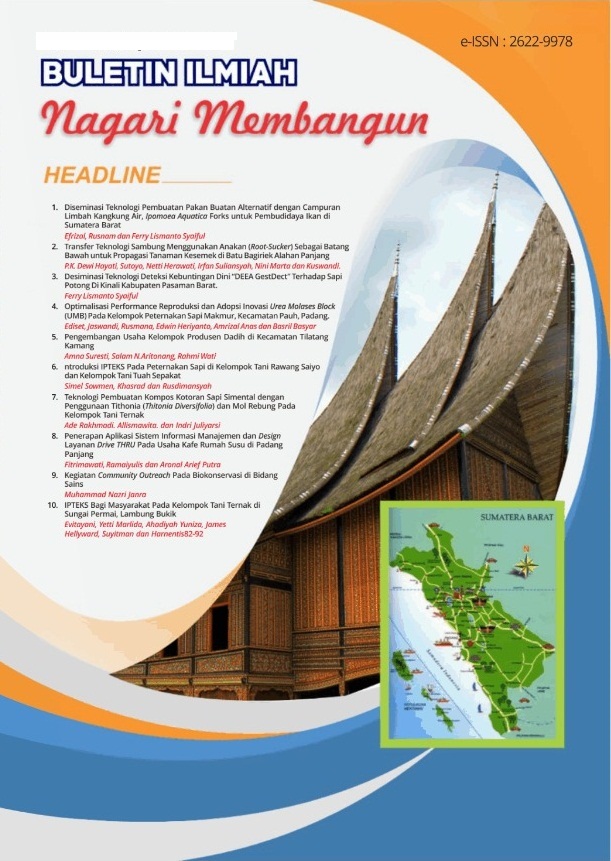PENGEMBANGAN POTENSI EKOWISATA AIR TERJUN DI KECAMATAN MUNGKA KABUPATEN LIMA PULUH KOTA
Abstract
Natural objects in Mungka District, Lima Puluh Kota Regency have great potential to become tourist objects that need to be developed, one of which is the Burai Waterfall Ecotourism. Burai Waterfall is still very natural and has not been touched much and has not been contaminated by non-natural materials, this allows this natural object to be developed as an ecotourism object, so that its natural conditions can be maintained. The current problem faced is that in its development efforts it is necessary to get support from the relevant local government and great support from the local community. The purpose of this activity is to create sectoral support and synergy for local government that can support the sustainability of Burai Waterfall ecotourism. The method used is the Focus Group Discussion (FGD) in gathering input from the relevant local governments. From the results of the FGD activities that have been carried out, it can be concluded that the development of waterfall ecotourism can be carried out and has the support of all relevant stakeholders. Local communities must be able to increase their participation in this ecotourism development effort. Apart from that, support and cooperation are important with the Disaster Management Agency because this service needs to assess in advance how the circumstances and conditions are likely to occur in this ecotourism development area.
Downloads
References
Bjork, P. (2000). Ecotourism from a conceptual perspective: An extended definition of a unique tourism form. International Journal of Tourism Research, 2, 189-202.
Diamanti, D. (1998). Environmental auditing: A tool in ecotourism development. Eco-Management and Auditing, 5, 15-21.
Fandeli, C. (2000). Pengertian dan Konsep Dasar Ekowisata. Yogyakarta: Fakultas Kehutanan Univ. Gadjah Mada.
Handayani, D., & Lazuardi, S. V. (2022). Stakeholder roles on tourism management, environment protection, and conservation in post Covid-19. IOP Conference Series: Earth and Environmental Science, 1111.
Holik, A. (2016). Relationship of economic growth with tourism sector. JEJAK: Journal of Economics.
Lee, J., & Choi, H. (2017). Stakeholder’s views on reducing financial support in government-led ecotourism areas. Ocean & Coastal Management, 144, 7-15.
Ryel, R., & Grasse, T. (1999). Marketing tourism: Attracting the elusive ecotourist. In Whelan, T. (Ed.), Nature Tourism: Managing for the Environment. Washington, DC: Island Press.
Subadra. (2008). Ekowisata hutan mangrove dalam pengembangan pariwisata berkelanjutan. Sumatera: Universitas Sumatera Utara.
Sufirwan, N. A., et al. (2022). Peningkatan kapasitas kelompok sadar wisata berbasis community-based tourism di Nagari Sitapa Kecamatan Luak Kabupaten Lima Puluh Kota. Buletin Ilmiah Nagari Membangun, 5(2). E-ISSN: 2622-9978.
Supriyadi, E. (2007). Telaah kendala penerapan pengembangan ekonomi lokal: Pragmatisme dalam pendekatan PEL. PWK, 18(2), 103-123. Bandung: PWK-ITB.
Wiyonoputri, W. T. (2008). Citra destinasi pariwisata: Suatu tinjauan konseptual. Pariwisata Indonesia Menuju Destinasi Pariwisata Berdaya Saing, 5, 24-25.





















